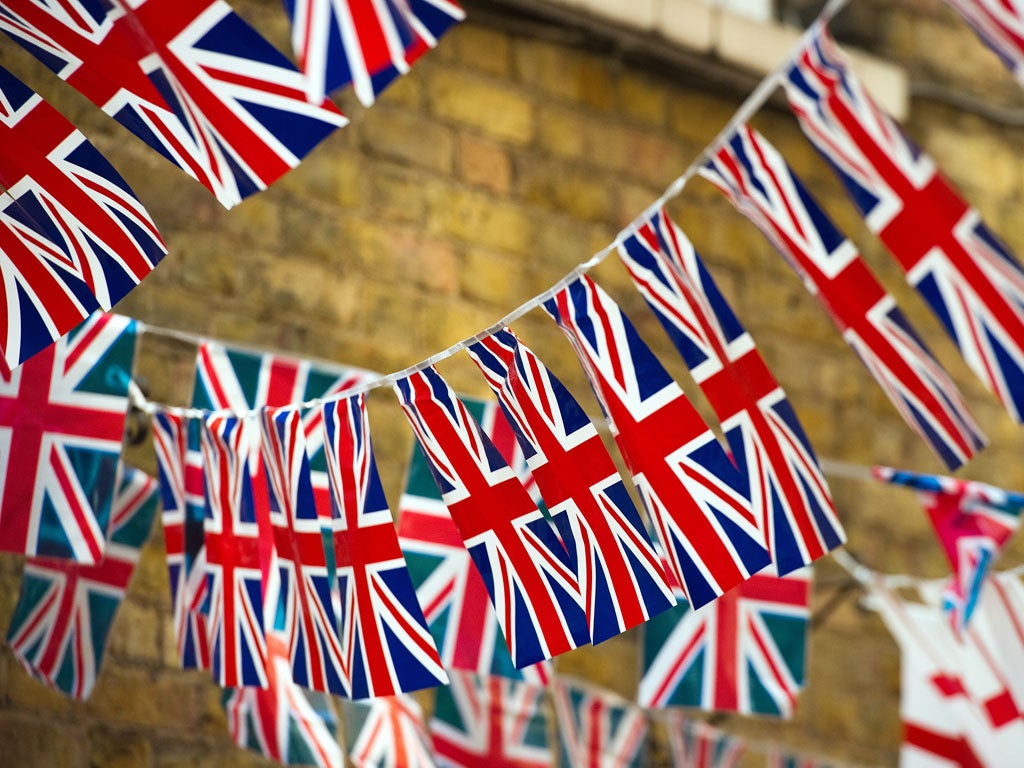Terence Blacker: The one thing worth celebrating in this beanfeast of a Jubilee
Orwell's case against the disdain of British patriotism by Europeanised intellectuals still rings true

The flags have been going up in my local town. Bunting drapes the buildings in the main shopping street. On the Sunday morning before the Jubilee weekend, the place was full of men with yellow coats and ladders. Already, in the shop windows, there are photographs of the Queen, pictured both as she is now and as a young woman in the early years of her reign.
This activity does not seem to be prompted by the usual kind of civic obligation. Key events in the calendar rarely, in this part of the country at least, cause much of a stir – a fund-raising event for Christmas lights in a nearby market town raised precisely £5. The flags, posters and photographs of this moment are part of something strikingly, bewilderingly different. They feel heartfelt, personal – almost like an expression of love.
"In England patriotism takes different forms in different classes, but it runs like a connecting thread through nearly all of them," George Orwell wrote in 1941. "Only the Europeanised intellectuals are really immune to it." His essay England Your England was written in the darkest hours of the war but, over 70 years later in a time of peace, it still has resonance for English, indeed British, culture. Differences between our own nationalities, he argued, fade away when two Britons are confronted by a European.
The country then was divided by class and exploitation, there was hypocrisy in public discourse, a general xenophobia, a distrust of militarism, and the judiciary was out of touch; it was "a land of snobbery and privilege, ruled largely by the old and silly". Apart from the age of our rulers, not much has changed, and Orwell's case against the disdain of British patriotism by those Europeanised intellectuals still rings true.
Unlike in other countries, whose sense of nationhood is expressed in rallies and marches, in England "all the boasting and flag-wagging, the 'Rule Britannia' stuff, is done by small minorities", Orwell wrote then, and could write today. The British had an instinctive distaste for officialdom, for being organised and corralled by Nosey Parkers, local or national – and still have. Seven decades on, it would still be accurate to note "the privateness of English life", as expressed by an addiction to hobbies.
The mad Jubilee beanfeast exemplifies how little has changed. The Queen's reign of 60 years will be celebrated with Union Jack cakes, small community parties, photographs in shop windows. If Cameron or Osborne had been unwise enough to become seriously involved in the plans, interest would quickly have been eroded by cynicism.
Orwell argues that, for all its spectacular failings, the flaws of British society are also a source of strength. Judges might be out of touch but they are not institutionally bent. The media is self-interested and greedy but cannot be openly bribed. Those in charge may be deluded, but they are not actively wicked. Then, as now, the illusions of our national life – that society is run along the lines of fair play, democratic justice and equal opportunity – play a part in the way we live and are governed. They are "the strange mixture of reality and illusion... the subtle network of compromises by which the nation keeps itself in its familiar shape".
It is too easy to sneer at the flag-waving and the shiny, tearful faces of loyal subjects over the next few days. Patriotism is not inimical to intelligence. It is not even particularly conservative, being, as Orwell pointed out, "a devotion to something that is always changing and yet is felt to be mystically the same".
Not all of us will be inclined to sing "God Save The Queen". Many of us will enjoy the holiday without wanting to think too much about the emblem of hereditary privilege who is the focus of it all. The spirit of the Jubilee, though – odd, private, slightly shambolic, but powerfully felt – is worth celebrating.
Is there anyone more vain and touchy than a writer?
The literary world can hold its own against most other professions when it comes to vanity and silliness. Authors slap critics, trash the work of rivals under pseudonyms, whine that nobody takes them quite seriously enough.
The current spat between the thriller-writer Peter James and Martin Amis beautifully illustrates how pathetic authors can be. They went to the same school and, at an awards ceremony a couple of years ago, James approached Amis and unwisely did the "You won't remember me but..." thing.
"I don't remember you – and you only remember me because I'm famous" was the reply. Although there was an element of truth to the charge, it was needlessly unkind, suggesting, not for the first time, that Amis belongs to the VS Naipaul school of public relations. In retaliation, James included in his new novel Not Dead Yet a character called Amis Smallbone who has – wouldn't you guess it? – a very small penis.
Which of these veteran authors emerges from this story with least credit? On the grounds of effortful unfunniness, it has to be Mr James.
Join our commenting forum
Join thought-provoking conversations, follow other Independent readers and see their replies
Comments
Bookmark popover
Removed from bookmarks